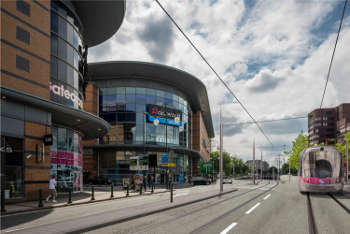Delivering billions of pounds of nationally-funded and local transport investment in the West Midlands will require a level of inter-agency cooperation that has rarely been seen before, as well as new powers, according to the region’s transport body.
Transport for West Midlands (TfWM) - the transport arm of the West Midlands Combinded Authority (WMCA) - has launched a public consultation on a transport blueprint that it says will see tram extensions, new suburban rail lines, cycle routes and motorway improvements built over the next ten years.
The plan contains details of nearly 200 schemes and initiatives representing some £8bn worth of investment. Of 77 committed schemes, with a total capital cost of £5.1bn, the majority are partially funded, with £3.4bn funding identified.
Many of the funded, committed schemes are the 23 schemes in an 'HS2 Connectivity Package', plus the two related Metro tram extensions.

The Metro is to be extended along Broad Street to Edgbaston by 2021
TfWM’s Draft 2026 Delivery Plan sets out a timetable for the construction of schemes the WMCA believes will unlock economic growth and capitalise on the arrival of HS2. This includes tram extensions in Birmingham, Solihull and the Black Country, new rail infrastructure and improvements to key motorway and road junctions.
Laura Shoaf, managing director of TfWM, said: ‘It’s about which schemes should be built and when, so that we secure the biggest bang for our buck and have the right transport infrastructure in place to maximise the already significant economic benefits of HS2.’
The document states that delivering local transport investment alongside £24bn of HS2 Phase 1 construction; £1.8bn of work in the current Road Investment Strategy and £550m from Network Rail ‘will require a level of inter-agency cooperation that has rarely been seen before’.
It discloses that TfWM ‘has been negotiating with government for further powers and agreements to enable the delivery by all partners – HS2 Ltd, Highways England, Network Rail and WMCA Authorities - to be a success’.
It adds: ‘Disruption to normal travel patterns cannot be avoided, but with strong governance supported by the most senior politicians and executives; a culture of collaboration; and excellent communication, a network which is resilient to disruption can be achieved.’
Two over-arching principles in the document are ‘Ensuring all parts of the West Midlands are “plugged-in” to the two High Speed Rail Stations’, and ‘steering transport investment into priority corridors for new jobs and homes’.
The document proposes ‘A Rail Based Renaissance’, warning that ‘without a successful working relationship with the rail industry few of our other priorities can be achieved’.
On roads, it states that while a focus of activity for the next 10 years will be building the business case for addressing major strategic challenges on the strategic road network,
‘Underpinning this work will be a concerted effort to improve the coordinated management and investment in the West Midlands Key Route Network (WM-KRN).' This is a 592km network of local authority highways across the region.
The document also proposes to explore ‘Very Light Rail’ - an affordable alternative to conventional light rail systems, which would utilise lightweight technology for both vehicles and tracks.
Register now for full access
Register just once to get unrestricted, real-time coverage of the issues and challenges facing UK transport and highways engineers.
Full website content includes the latest news, exclusive commentary from leading industry figures and detailed topical analysis of the highways, transportation, environment and place-shaping sectors.
Use the link below to register your details for full, free access.
Already a registered? Login